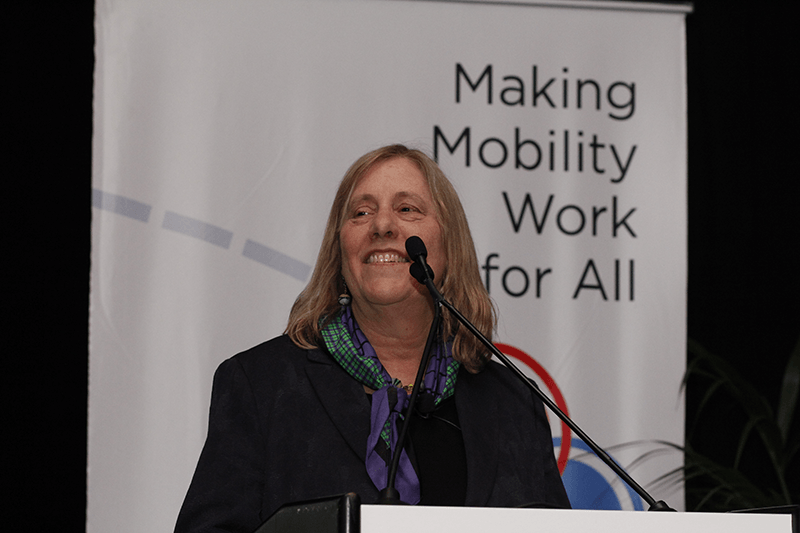Welcome to the Shared-Use Mobility Center’s weekly guide to the most impactful news, thought-provoking articles and innovative technologies that are shaping our transportation future. We believe in sharing information, just like sharing cars, bikes, and scooters, so if there’s anything additional you’d like to see, just drop us a line.
SUMC Executive Director Sharon Feigon’s Top Ten Summit Takeaways

On March 5, 6, and 7, SUMC brought together (more than 700 mobility practitioners from 40 States and 14 countries—including policymakers, public and private sector leaders, agency heads, startups, and researchers—for the 2019 National Shared Mobility Summit. It is the only conference of its kind that focuses not just on sharing the latest developments in shared mobility, but on asking tough questions, digging for real answers and collaborating on breakthrough solutions.
We’re thankful to everyone who took part in meaningful conversations at this year’s Summit and helped bring us closer to Shared Mobility for all. Without further ado, here are Sharon’s Top Ten Takeaways.
You can see what people had to say about the Summit on Twitter here: #SUMC19 Tweets.
Ridehailing and Carpooling
Ridehailing company Via aims to take cars off the road to reduce congestion and emissions, but can they achieve success with a transportation infrastructure that does the exact opposite?
Lyft has filed to go public and wants to prove to investors that it can be profitable, shaking doubts about its ridehailing business.
Over in Southeast Asia, local ridehailing giant Grab secures $1.5 billion in funding from Softbank.
Carsharing
More car owners are using carsharing to defray the cost of purchasing new vehicle – and getting the wheels they really want.
German mobility company Sixt has launched a new app that brings together carsharing, long-term car rental, and ridehailing services in 250 major cities in Europe and the US.
GIG carshare is making its way to downtown Sacramento with plans to expand to 260 EVs by the end of April.
CarShare Atlantic in Halifax is the first carshare service in Canada with accessible vehicles, helping give people with disabilities more freedom and independence in mobility.
Bikesharing and Micromobility
If you missed out on the 2019 Shared Mobility Summit, check out what Forbes had to say about one of our panels discussing the coexistence and growth of docked and dockless bikeshare in cities.
Olympic runner Usain Bolt makes a case for sustainable micromobility with new support of scooter startup Bolt Mobility in New York.
Barcelona revamped its bikeshare system with new bikes, updated stations, and added coverage. Its next phase of improvements? More pedal-assist bikes.
Transit
There are many forces at work that aim to shut down transit projects in the US. Mobility Lab looks at why.
Vancouver and Toronto score high on a ranking of the best cities for public transit in Canada by real estate company Redfin.
New projects propose to fix struggling service for DC’s Metro and boost ridership, but will that be enough to reverse long-standing decline?
Check out these illustrated maps showing the history of Chicago’s “L” train system on Block Club Chicago.
Technology
Missed the 2019 National Shared Mobility Summit Startup Spotlight? Read about our innovative competitors and the winner on Forbes!
In coordination with Volvo, Singapore has launched the world’s first trial of full-sized autonomous EV transit buses.
What can cities do to subvert the worst-case scenario for the future of automated vehicles? Community-driven planning for car-free downtowns, more walking/biking , and first/last mile service to transit is a great place to start.
It looks like Google’s autonomous vehicle arm Waymo wants to get into the hardware game with new focus on lidar technology.
Urban Sustainability
How can integrated mobility hubs create a one-stop shop for transit and shared mobility? Read about SUMC’s work in Minnesota with the Twin Cities Shared Mobility Collaborative.
Designated ridehailing pickup/dropoff zones and a possible congestion-pricing fee are being proposed in Massachusetts by Boston Mayor Marty Walsh.
Demand-based parking pricing can do wonders to relieve congestion and get people to use more active modes of transportation. A new District DOT reportshows how it worked in DC’s Chinatown.
Did someone forward this to you? You can sign up for our newsletter here.




